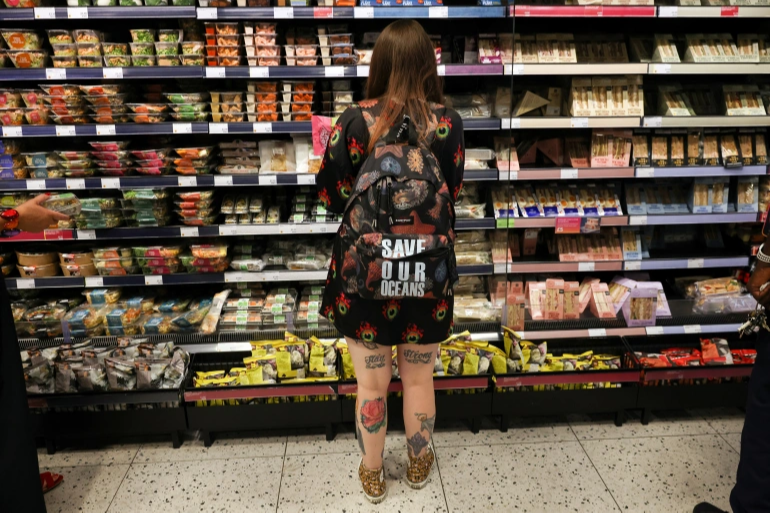
A woman looks at food products in a London shop as UK inflation heads past 10 percent [Kevin Coombs/Reuters]
London, August 18 (RHC)-- British consumer price inflation jumped to 10.1 percent in July, its highest since February 1982, up from an annual rate of 9.4 percent in June, intensifying the squeeze on households, according to official figures.
The increase – announced on Wednesday – will do nothing to ease the Bank of England’s concerns that price pressures may become entrenched. Despite warning that a recession was likely, the BoE earlier this month raised its key interest rate by 0.5 percent to 1.75 percent – its first half-point rise since 1995. It forecast inflation would peak at 13.3 percent in October, when regulated household energy prices are next due to rise.
“Every upward inflation surprise tightens the bind the BoE finds itself in, with mounting inflation pressure combined with growing recessionary headwinds,” said Luke Bartholomew, senior economist at asset manager abrdn.
He, like most economists in a Reuters news agency poll earlier this week, expects the BoE to raise interest rates by a further half point to 2.25 percent at its next meeting in September. Two-year British government bond yields – which are sensitive to interest rate expectations – surged to their highest since June 21, when they had struck a 13-year high.
Wednesday’s figures from the Office for National Statistics showed that prices rose 0.6 percent in July from June on a non-seasonally adjusted basis. The annual rate of retail price inflation hit 12.3 percent, its highest since March 1981.
Britain is not alone in facing soaring price growth but there are signs it will continue to struggle with rising inflation for longer than other countries. Many economists believe US inflation has peaked after it dropped to 8.5 percent in July from a 40-year high of 9.1 percent in June.
Nadhim Zahawi, Britain’s finance minister, said getting inflation under control was his top priority.
However, there were hints in the data that future inflation pressure might be starting to abate. Although the prices charged by factories rose by the most since August 1977, jumping by 17.1 percent, the increases in prices paid by factories cooled slightly, dropping to an annual 22.6 percent from June’s record 24.1 percent.
In month-on-month terms, input prices rose by only 0.1 percent, the slowest increase so far in 2022, partly caused by weaker global demand for steel as economic growth slows around the world and crude oil prices fall.
The forecasts that Britain’s inflation problem will be longer-lasting than in other countries stem in part from price regulations which mean energy companies must wait before passing higher wholesale costs on to consumers.
The current typical annual household energy bill is just under 2,000 pounds ($2,421) – almost double its level a year ago – and is likely to rise above 4,000 pounds in January, according to industry analysts Cornwall Insight.
Millions of British households will struggle with the higher bills, and supermarkets already report customers switching to cheaper brands.
Data on Tuesday showed workers’ earnings adjusted for the consumer prices index fell by 4.1 percent in the three months to June, the biggest drop since records began in 2001. The two candidates to become Britain’s next prime minister have been under pressure to say what they will do to help.
Foreign secretary Liz Truss, the frontrunner, has said she would try to work with energy companies to bring prices down, while former finance minister Rishi Sunak has said he would scrap value-added tax on energy bills for a year.
The opposition Labour Party has called for a freeze in energy prices, partly funded by an expanded windfall tax on energy companies which have reported bumper profits.

